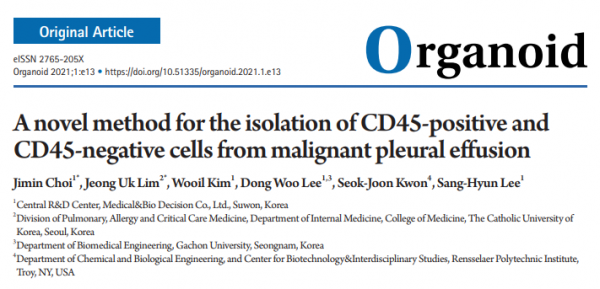Paper 2022, Organoid(Original Article), A novel method for the isolation of …
Page Info

Contents
Background
Patient-derived malignant pleural effusion (MPE) samples can be used to identify a patient-specific drug combination since MPE samples are readily available and cost-effective tumor cell sources. However, the isolation of target cancer cells from MPE has been inefficient because MPE samples contain a complex mixture of immune cells, non-cancerous cells, and cancer cells. Hence, new methods need to be developed to effectively isolate target cancer cells from MPE samples that can be used for 3-dimensional (3D) cell culture. Patient-derived in vitro 3D tumor models are expected to facilitate more precise drug treatment.
Methods
MPE samples were obtained from Seoul St. Mary’s Hospital, The Catholic University of Korea with consent from patients previously diagnosed with lung adenocarcinoma. We isolated target cells from MPE samples using 2 different Percoll-gradient centrifugation methods.
Results
The use of 40% and 75% Percoll-gradient centrifugation led to a clearer separation of CD45-positive (CD45pos) and CD45-negative (CD45neg) cells than the traditional 44% and 67% Percoll-gradient centrifugation method.
Conclusion
Our findings strongly suggest that the 40% and 75% Percoll-gradient centrifugation method is more useful for the isolation of CD45pos or CD45neg cells than the previously described Percoll-gradient centrifugation method. Furthermore, our novel method was useful for the isolation of MPE-derived target cancer cells that can be used to construct in vitro patient-specific 3D tumor models.
Patient-derived malignant pleural effusion (MPE) samples can be used to identify a patient-specific drug combination since MPE samples are readily available and cost-effective tumor cell sources. However, the isolation of target cancer cells from MPE has been inefficient because MPE samples contain a complex mixture of immune cells, non-cancerous cells, and cancer cells. Hence, new methods need to be developed to effectively isolate target cancer cells from MPE samples that can be used for 3-dimensional (3D) cell culture. Patient-derived in vitro 3D tumor models are expected to facilitate more precise drug treatment.
Methods
MPE samples were obtained from Seoul St. Mary’s Hospital, The Catholic University of Korea with consent from patients previously diagnosed with lung adenocarcinoma. We isolated target cells from MPE samples using 2 different Percoll-gradient centrifugation methods.
Results
The use of 40% and 75% Percoll-gradient centrifugation led to a clearer separation of CD45-positive (CD45pos) and CD45-negative (CD45neg) cells than the traditional 44% and 67% Percoll-gradient centrifugation method.
Conclusion
Our findings strongly suggest that the 40% and 75% Percoll-gradient centrifugation method is more useful for the isolation of CD45pos or CD45neg cells than the previously described Percoll-gradient centrifugation method. Furthermore, our novel method was useful for the isolation of MPE-derived target cancer cells that can be used to construct in vitro patient-specific 3D tumor models.
Related Links
-
https://j-organoid.org/journal/view.php?number=24
2633Connected
- Prev
 2022, International Journal of Molecular Sciences, High-Throughput 3D Tumor Spheroid Array Platform for Evaluating Sensitivity of Proton-Drug Combinations 23.05.22
2022, International Journal of Molecular Sciences, High-Throughput 3D Tumor Spheroid Array Platform for Evaluating Sensitivity of Proton-Drug Combinations 23.05.22 - Next
 2022, International Journal of Molecular Sciences, Patient-Derived Tumor Organoids for Guidance of Personalized Drug Therapies in Recurrent Glioblastoma 23.05.22
2022, International Journal of Molecular Sciences, Patient-Derived Tumor Organoids for Guidance of Personalized Drug Therapies in Recurrent Glioblastoma 23.05.22

